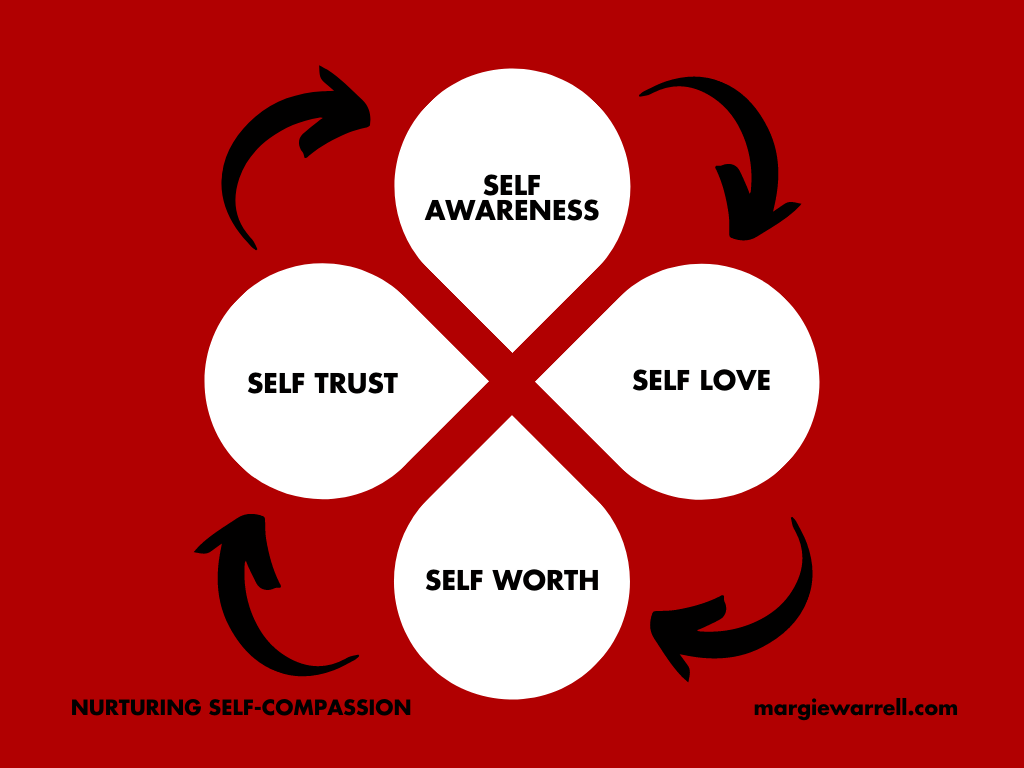Turn Your Compassion Inward

You’re such an idiot. Seriously, when will you ever figure this out.
You’re just not (good-smart-together-accomplished-successful-Fill-in-the-blank) enough.
You’re a lousy presenter/parent/partner/person/(fill in the blank)
How often have you heard a little voice inside your head pointing out your mistakes, critiquing your conversations, or berating you for not falling short of your ideal (unlike ‘everyone else’ who seems to glide along effortlessly)?
a) All the time? I’m always beating myself up.
b) Sometimes?
c) Never? I’m absolutely awesome.
If you answered c), I suggest you move on. This article is not for you (another one on narcissism might be though.)
If you answered a) or b), then keep reading, particularly if you answered C!
Let’s face it, if there’s one thing many of us are good at, it is beating up on ourselves. Despite how kind we can be to those around us in difficult moments, many people can be outright cruel to themselves. Our innate negativity bias drives us to attend far more to our failures and dwell on our deficiencies.
And when we do nail the presentation, win the prize and get it right? We quickly downplay or pass over those successes with only a fleeting celebratory moment before our attention is pulled back to what we have yet to achieve or could still do that bit better.
It’s a vicious, negatively self-reinforcing cycle.
Enter self-compassion.
Of course, compassion is a virtue we all admire. Yet research shows that many people – particularly women – find it far easier to extend compassion toward others than toward themselves.
Dr. Kristin Neff, a professor at the University of Texas, literally wrote the book on Self Compassion. I also got to interview her on my Live Brave podcast where she shared her theoretical framework for self-compassion which consists of three core components – self-kindness, common humanity, and mindfulness of suffering. I expanded on these in this Forbes column you can read here.
Now you might be thinking to yourself…
Isn’t this fluffy feel-good stuff?
Many people I coach, often very purpose-driven high-achievers, can be pretty tough on themselves. Sometimes they respond cynically to my suggestions to be a little kinder to themselves.
Surely going easy on myself is self-indulgent? It’s setting the bar high and expecting a lot from myself that drives me to work hard and get ahead. Heck, I’d probably turn into a lazy slacker if I stopped being so hard on myself.
I get it.
But the data shows otherwise. Studies have found that people who practice self-compassion are not less motivated to work hard and get ahead, they are more so.
Self-compassion can sound like a scapegoat to facing the harder realities of life and taking ownership of when we mess up and a little self-criticism is required to lift our game. Yet research shows that being kind to yourself isn’t just a nice thing to do, it’s smart. In fact, multiple studies show that self-compassion is a stronger predictor of resilience after setbacks than self-esteem, helping us to learn from our mistakes faster, and bounce back from them better.
It may sound counter-intuitive but when we learn to stop being so hard on ourselves it creates the space for us to be braver with our lives. When we don’t measure self-worth based on the results we achieve, we are more likely to try things and risk failure.
One study found students with higher levels of self-compassion handled disappointment more positively and stayed more motivated to keep trying after their failures. This made them less prone to performance anxiety Because self-compassion circumvents the often-debilitating self-evaluation process, it liberates people to give themselves permission to risk failure more often. This in turn helps them learn more, grow more, and succeed more.
Want to nurture your own self-compassion?
Of course, nurturing self-compassion isn’t as simple as 1, 2, 3. Few worthy endeavors are. However, I’ve created this four-step framework to help you turn your compassion inward.
SELF AWARENESS
If you’re wondering how you can be more compassionate with yourself, I invite you to start by simply paying attention to how often you aren’t. Practicing becoming more aware of that negative noise in your head -commonly referred to as the ‘inner critic’ – is a powerful first step to loosening the grip it often holds on you.
If your inner critic has permanently set up shop in your head, chances are your self-recriminations have become transparent to you. As someone with a well-entrenched habit of focusing on my flaws and shortcomings, I have become better at catching myself in self-critical moments (there are plenty to catch!).
SELF LOVE
Once you’ve caught yourself being tough on yourself, ask yourself what a loving friend or God might say to you in that moment. Then say that to yourself… ideally out loud. I get that it sounds a little woo-woo, but I invite you to try it. Then notice how it shifts how you’re feeling, however subtly.
The truth is that we are all ‘human becomings’ – fallible, flawed, and wired to dwell more on our shortcomings and failings than we are to celebrate our strengths and successes. As I share in my Live Brave podcast with Dr Neff, it is by embracing our humanity – for all that we are and for all that we aren’t – that we can savor more moments of gratitude, joy, and connection over the course of an ordinary day. We can also spare ourselves the needless suffering that comes from feeling isolated, inadequate, and unworthy.
SELF WORTH
By accepting who you are it frees you to let go of what isn’t serving you and to focus in on what will. As I also wrote in You’ve Got This! self-compassion is a cornerstone to self-improvement. So ask yourself: what might I do right now to support myself in doing better in the future? Perhaps there’s something valuable you need to learn or work on. If you’ve failed at achieving a goal you set or are handling a setback you hadn’t anticipated, be sure to seize whatever lessons it holds. As I like to say, never let a setback go to waste!
You don’t build self-confidence and grow into the person you want to be by sitting at home and thinking about it. Nope, you grow into the person you want to be by taking action.
Brave action. Forward action. Worthy action.
Sure positive affirmations are great for building confidence. But, to cite a basic premise in psychology, if you want to build self-worth start by doing worthy things.
Do worthy things.
Not to be perfect (which, let’s face it, is a fruitless endeavor destined that leaves you on a merry-go-round of striving, never arriving, and life-long self-recrimination), but to become more of the flawesome human-becoming you already are.
SELF TRUST
As I wrote in You’ve Got This! The Life-Changing Power of Trusting Yourself, who you are is not your doubts, not your past failings or present circumstances. Nope, who you are is innately worthy, wholly adequate and fully capable of creating a life that is deeply meaningful. (If that sounds like truth, maybe it is.)
Accordingly, every time you decide to defy those negative voices that are not loving and only fuel self-doubt, you empower yourself and build self-trust.
Ask yourself, what would I do right now if trusted myself more fully? Then whatever your answer, go do it. And however things work out, be kind to yourself. Because as Jack Kornfield wrote, “If your compassion doesn’t include yourself, it is incomplete.”
So let me ask you one final question… if you were being really kind and loving to yourself right now, what is one thing you would do (or stop doing)?
I encourage you to do it. To turn your compassion inward. Not just because it’s a nice thing to do. Nor because it’s smart and will achieve more. Rather simply because you are worthy of it.



